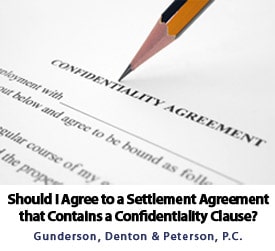

Gunderson, Denton And Peterson Office Locations
View View Gunderson, Denton And Peterson Locations in a larger map
Litigation With A Positive ROI
Should I Agree to a Settlement Agreement that Contains a Confidentiality Clause?
 When two parties have been involved in litigation, they may agree to settle their case for a variety of reasons. Many times, one or more of the parties want to include a confidentiality clause in the settlement agreement. Confidentiality clauses limit the types of things that the parties can say about the dispute. Before agreeing to a settlement offer that contains a confidentiality clause, it is important to consider your options carefully.
When two parties have been involved in litigation, they may agree to settle their case for a variety of reasons. Many times, one or more of the parties want to include a confidentiality clause in the settlement agreement. Confidentiality clauses limit the types of things that the parties can say about the dispute. Before agreeing to a settlement offer that contains a confidentiality clause, it is important to consider your options carefully.
In one recent case, an employee who had brought a wrongful termination suit against his employer entered into a settlement agreement wherein the employee was to receive $10,000 in back wages, plus an additional settlement amount of $80,000. Remedies for employment bias include back pay, which compensates the affected employee for lost wages and benefits resulting from the discriminatory practices. The settlement agreement contained a confidentiality clause – limiting the employee’s ability to discuss the terms of the settlement. Unfortunately, for the employee, after telling his daughter about the settlement, his daughter decided to post about it on Facebook. As a result of the daughter’s Facebook post, the employer refused to pay the settlement amount- saying that the employee had violated the settlement agreement. The trial court sided with the employer.
The moral of the story is that confidentiality clauses are serious business. If you agree to one and violate it, you can lose your entire settlement.
Here are a few things to keep in mind when deciding whether to include a confidentially clause in your settlement agreement:
1) Are there specific things about your case that you do not want others to know about?
In many cases, defendants are especially interested in protecting the confidentiality of the facts in their case. You may be agreeing to a settlement of a case largely to avoid the bad publicity associated with taking a case all the way through litigation. Other times, you may be worried that information in one case may be used against you in another case.
2) Are there specific things that the other side does not want anyone to know about?
Sometimes, you may not have a strong interest in keeping information confidential, but you know that the other side takes confidentiality very seriously. Including a confidentiality agreement may be an important bargaining chip that you can use to increase the size of the settlement you receive from the opposing party or to decrease the size of the settlement amount you are required to pay. In either case, it is important to understand all of the costs and benefits associated with signing a confidentiality clause.
3) Might public knowledge of your settlement invite future lawsuits?
This can be an especially important consideration when settlement amounts are high. If people perceive you as an easy target or someone with deep pockets, they may be more likely to bring a lawsuit of their own- hoping to cash in with another high settlement offer.
For this reason, many companies make it a standard policy to include confidentiality clauses in their settlement agreements.
4) Might public knowledge of your settlement discourage future lawsuits?
This may be more applicable to plaintiffs, but sometimes litigants really WANT to make an example out of someone. For example, if a patent holder earns a large settlement from someone who infringed on their patent, that patent holder may be able to use the settlement as an example of what happens to people who infringe on their patents. This can be a valuable tool that the patent holder can use to force other infringers to settle or to discourage people from infringing on their patent all together. In these types of cases, you might ultimately decide that you do not want to include a confidentiality clause in your settlement agreement. At the very least, you may want to ensure that any confidentiality clause be narrowly tailored to your specific circumstances.
Of course, these are just a few key considerations that every litigant should consider before signing a settlement agreement that contains a confidentiality clause. You should always contact a qualified attorney before signing such an agreement. The attorneys at Gunderson, Denton & Peterson are experienced in litigating and negotiationg settlement terms. For more information, contact us here.
Published By:
Gunderson, Denton & Peterson, P.C.
Mesa Office:
1930 N Arboleda #201
Mesa, Arizona 85213
Office: 480-655-7440
Fax: 480-655-7099
Email: brad@gundersondenton.com
Website: https://gundersondenton.com
Phoenix Office:
40 N Central Ave #1400
Phoenix, AZ 85004
Phone: 480-325-9937
Website: https://gundersondenton.com/phoenix
Meet Our
Business Attorneys
GDP Business Blog
Preliminary Injunctions and Temporary Restraining Orders: What are they and how can I use them?
A Lesson in Court Etiquette: The Sterling Standard
When to Litigate and When to Settle
You Might Be Giving Up Legal Rights By “Liking” a Company On Facebook
ADR as an Alternative to Litigation
How to Damage Your Case at Your Deposition – by Justin Bieber
Should I Agree to a Settlement Agreement that Contains a Confidentiality Clause?
Question To Ask Before You Choose An Attorney For Your Lawsuit
Sterling Peterson – Arizona Litigation Attorney at Gunderson, Denton & Peterson, P.C.
How can I tell if my attorney is going to treat me fairly?
Mediation: how it works and why you should try to make it work
Arizona Business Law
Arizona Business Lawyers
Link about our Arizona Business Lawyers.Arizona Collections Law
Arizona Collections Lawyer
This link talks about our collection lawyers in Arizona.Arizona Employment Law
Arizona Employment Lawyer
This link is about our employment lawyers in Arizona.Arizona Estate Planning
Arizona Estate Planning Lawyer
This link is about our estate planning lawyers in Mesa Arizona.- Mesa Estate Planning Attorney
This link talks about our estate planning lawyers in Mesa Arizona. Arizona Franchise Law
Arizona Franchise Attorney
This link is about our Arizona Franchise Attorneys.Arizona Immigration Law
Arizona Immigration Attorney
This link is about our immigration attorneys in Mesa Arizona.- Arizona Visa Lawyer
This link is regarding our Arizona Visa Lawyers. - EB-5 Immigration Visa
This page talks about EB-5 immigration visas. - Investor Visa
This page talks about investor visas by our immigration lawyers in Mesa. - Mesa Arizona Immigration Lawyer
This link is regarding our immigration attorneys in Mesa. Arizona Litigation Matters
- Arizona litigation lawyers
This link is about our litigation lawyers in Mesa Arizona. - Mesa Litigation Attorney
This link talks about out litigation lawyer in Mesa Arizona. Arizona Probate Law
Arizona Probate Lawyers
This link is about our Arizona probate lawyers.Arizona Real Estate Law
Arizona Real Estate Lawyers
This link is about our real estate lawyers in Mesa Arizona.- Phoenix Real Estate Lawyer
This link is about our knowledgeable real estate attorneys in Phoenix, Arizona.
 contact@gundersondenton.com
contact@gundersondenton.comMesa, AZ 85213
Phone: 480-655-7440
Office Hours
Monday-Friday 8am-5pm




